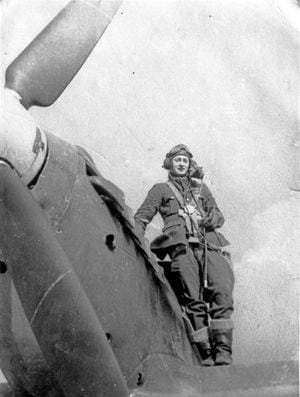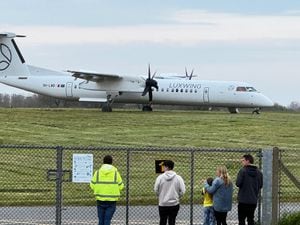WW2 pilot who landed in Lihou mistook island for Dover cliffs
A SECOND World War pilot who mistook greenhouse reflections for the White Cliffs of Dover, parachuted into Nazi-occupied Guernsey and ended up as a prisoner of war.

Part of 87 Squadron, Sgt Robert Stirling from Glasgow, had lost his bearings and was running low on fuel while chasing a German bomber towards France on a routine patrol in April 1941.
On his attempt to return to Exeter in Devon, his base at that time, using a broken compass, he instead landed on uninhabited Lihou after bailing out of his aircraft believing the reflection of the island’s glasshouses was the white chalk cliffs of the south coast of England.
The costly error was due to huge swathes of Guernsey’s landmass being covered in glass as a result of its extensive horticultural industry.
Landing late in the night, Sgt Stirling walked unscathed across a minefield and the Lihou causeway, finding refuge at couple Tom and Myra Brouard’s home, Les Bordes, in St Saviour’s.
‘Mr Brouard let him in and Mrs Brouard gave Sgt Stirling some meat and boiled potatoes and two cups of coffee [and] they stayed up all night talking,’ said Guernsey historian and tour guide Tim Osbourne who researched the story.
‘Sgt Stirling gave them his RAF papers, which Tom Brouard burnt the next day –this was something that he regretted and wished he had kept secretly hidden.
‘Incidentally, local fisherman George Le Couteur was woken up at half past midnight that same night by half a dozen armed German soldiers to take them in his boat to try and find an aircraft that they believed had gone into the sea somewhere off Lihou Island.’
They set off from Portelet and visited Les Hanois lighthouse, but nothing was found.
Sgt Stirling turned himself in to police and the Nazis the next morning when curfew had ended, with a Sgt Duquemin and PCs Harry Dyson and Archie Tardif arriving at the house along with a German officer and two non-commissioned officers taking him away.
Mr Brouard was also taken to L’Eree Hotel for interrogation, but was released when they realised ‘he did not really know anything of importance’.
Sgt Stirling was taken to a German Stalag IX PoW camp via France where he stayed for the remainder of the war, despite several escape attempts, including one by bicycle.
During this time he had been presumed dead by friends and family who were told he was missing in action. However, three weeks after his capture, an aunt of Sgt Stirling contacted his parents to let them know he was alive.
She lived in Canada but had extraordinarily been listening to the radio and heard a German propaganda broadcast report of his internment in the camp.
Sgt Stirling returned to his home in Glasgow after the war and took up a career in banking.
Sometime in the 1950s, he made contact with Mr Brouard with a view to visit them again in Guernsey, which he did in the late 1950s. An article of his visit was published in the Guernsey Press.
He found out that at the time he landed in Guernsey in 1941, Mrs Brouard had been pregnant, and upon giving birth to a son three weeks later in July, the couple had named him Robert George – after him.
Christmas cards were regularly sent between the two families until Sgt Stirling died in 1984, leaving his wife Betty and three children.





